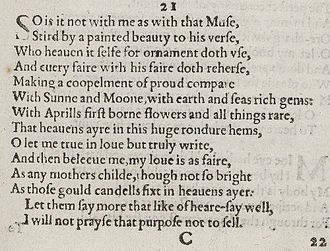
Back سونيت 21 Arabic Sonnet 21 French Sonnet 21 Dutch Sonet 21 (William Szekspir) Polish Soneto 21 Portuguese Сонет 21 Russian
| Sonnet 21 | |||||||
|---|---|---|---|---|---|---|---|
 Sonnet 21 in the 1609 Quarto | |||||||
| |||||||
Sonnet 21 is one of 154 sonnets written by the English playwright and poet William Shakespeare and is part of the Fair Youth sequence. Like Sonnet 130, it addresses the issue of truth in love, as the speaker asserts that his lines, while less extravagant than those of other poets, are more truthful. Contrary to most of Shakespeare's sonnets, Sonnet 21 is not addressed to any one person. There is no second person, no overt "you" or "thou" expressed in it.
- ^ Pooler, C[harles] Knox, ed. (1918). The Works of Shakespeare: Sonnets. The Arden Shakespeare [1st series]. London: Methuen & Company. OCLC 4770201.